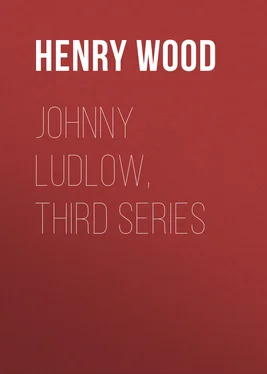Henry Wood - Johnny Ludlow, Third Series
Здесь есть возможность читать онлайн «Henry Wood - Johnny Ludlow, Third Series» — ознакомительный отрывок электронной книги совершенно бесплатно, а после прочтения отрывка купить полную версию. В некоторых случаях можно слушать аудио, скачать через торрент в формате fb2 и присутствует краткое содержание. Жанр: foreign_prose, literature_19, foreign_antique, на английском языке. Описание произведения, (предисловие) а так же отзывы посетителей доступны на портале библиотеки ЛибКат.
- Название:Johnny Ludlow, Third Series
- Автор:
- Жанр:
- Год:неизвестен
- ISBN:нет данных
- Рейтинг книги:4 / 5. Голосов: 1
-
Избранное:Добавить в избранное
- Отзывы:
-
Ваша оценка:
- 80
- 1
- 2
- 3
- 4
- 5
Johnny Ludlow, Third Series: краткое содержание, описание и аннотация
Предлагаем к чтению аннотацию, описание, краткое содержание или предисловие (зависит от того, что написал сам автор книги «Johnny Ludlow, Third Series»). Если вы не нашли необходимую информацию о книге — напишите в комментариях, мы постараемся отыскать её.
Johnny Ludlow, Third Series — читать онлайн ознакомительный отрывок
Ниже представлен текст книги, разбитый по страницам. Система сохранения места последней прочитанной страницы, позволяет с удобством читать онлайн бесплатно книгу «Johnny Ludlow, Third Series», без необходимости каждый раз заново искать на чём Вы остановились. Поставьте закладку, и сможете в любой момент перейти на страницу, на которой закончили чтение.
Интервал:
Закладка:
Yes. Christmas-Eve had come round, making it just a year since Jessy in her pretty blue mantle had chosen the sprays of holly in the church. They had never had from her but that one first unsatisfactory letter: they knew no more how she went, or why she went, or where she was, than they had known then. Within a week or two of the unsatisfactory journey to London of Miss Abigail and John Drench, a letter came to the farm from Mr. Marcus Allen, inquiring after Jessy, expressing hopes that she had been found and was at home again. It was not answered: Miss Page, busy with her father’s illness, neglected it at first, and then thought it did not matter.
Mr. Page had recovered from his stroke: but he would never be good for anything again. He was very much changed; would sit for hours and never speak: at times his daughters thought him a little silly, as if his intellect were failing. Miss Page, with John Drench’s help, managed the farm: though she always made it a point of duty to consult her father and ask for his orders. In the month of June they heard again from Mr. Marcus Allen. He wrote to say that he was sorry not to fulfil his promise (made in the winter’s visit) of coming to stay with them during the time of hay-making, but he was busy finishing a painting and could not leave it: he hoped to come at some other time. And this was now December.
Susan Page worked on: John Drench looked out of the window. The young lady was determined not to break the silence.
“The Dunn Farm is to let,” said he suddenly.
“Is it?” slightingly returned Miss Susan.
“My father has some thoughts of taking it for me. It’s good land.”
“No better than other land about here.”
“It’s very good, Susan. And just the place I should like. There’s an excellent house too, on it.”
Susan Page began rummaging in the deep drawer of the work-table for her box of buttons. She had a great mind to hum a tune.
“But I couldn’t take it, or let father take it for me, unless you’d promise to go to it with me, Susan.”
“Promise to go to it with you, John Drench!”
“I’d make you as good a husband as I know how. Perhaps you’ll think of it.”
No answer. She was doubling her thread to sew on the button.
“ Will you think of it, Miss Susan?”
“Well—yes, I will,” she said in a softer tone, “And if I decide to bring my mind to have you, John Drench, I’ll hope to make you a good and faithful wife.”
He held out his hand to shake hers upon the bargain. Their eyes met in kindliness: and John Drench knew that the Dunn Farm would have its mistress.
We were going to dress the church this year as we did the last. Clerk Bumford’s cough was bad, and the old sexton was laid by as usual. Tod and I got to the church early in the afternoon, and saw the Miss Pages wading their way through the coppice, over their ankles in snow: the one lady having finished her cake-making and the other her shirt-mending.
“Is Leek not here yet?” cried they in surprise. “We need not have made so much haste.”
Leek with his large truck of holly was somewhere on the road. He had started, as Miss Page said, while they were at dinner. And he was not to be seen!
“It is all through his obstinacy,” cried Susan. “I told him he had better take the highway, though it was a little further round; but he said he knew he could well get through the little valley. That’s where he has stuck, truck and all.”
John Drench came up as she was speaking. He had been on some errand to Church Dykely; and gave a bad account of the snow on the roads. This was the third day of it. The skies just now were blue as in spring; the sun, drawing towards the west, was without a cloud. After waiting a few minutes, John Drench started to meet Leek and help him on; and we cooled our heels in the church-porch, unable to get inside. As it was supposed Leek would be there sooner than any one else, the key of the church had been given to him that he might get the holly in. There we waited in the cold. At last, out of patience, Tod went off in John Drench’s wake, and I after him.
It was as Miss Susan surmised. Leek and his truck had stuck fast in the valley: a low, narrow neck of land connecting a byeway to the farm with the lane. The snow was above the wheels: Leek could neither get on nor turn back. He and John Drench were hard at work, pulling and pushing; and the obstinate truck refusing to move an inch. With the help of our strength—if mine was not worth much, Tod’s was —we got it on. But all this caused ever so much delay: and the dressing was begun when it ought to have been nearly finished. I could not help thinking of the other Christmas-Eve; and of pretty Jessy who had helped—and of Miss Susan scolding her for coming in her best blue mantle—and of the sudden looming upon us of the stranger, Marcus Allen. Perhaps the rest were thinking about it as I was. One thing was certain—that there was no liveliness in this year’s dressing; we were all as silent as mutes and as dull as ditch-water. Charley Page, who had made enough noise last year, was away this. He went to school at Worcester now, and had gone to spend the Christmas with some people in Gloucestershire, instead of coming home.
The work was in progress, when who should look in upon us but Duffham. He was passing by to visit some one ill in the cottages. “Rather late, shan’t you be?” cried he, seeing that there was hardly any green up yet. And we told him about the truck sticking in the snow.
“What possessed Leek to take it through the valley?” returned Duffham.
“Because he is fonder of having his own way than a mule,” called out Miss Susan from the aisle.
Duffham laughed. “Don’t forget the gala bunch over the parson’s head; it looked well last year,” said he, turning to go out. And we told him there was no danger of forgetting it: it was one of our improvements on old Bumford’s dressing.
Darkness overtook us before half the work was done. There was nothing for it but to get candles from the Copse Farm to finish by. No one volunteered to fetch them: a walk through the snow did not look lively in prospective to any one of us, and Leek had gone off somewhere. “I suppose it must be me,” said John Drench, coming out from the holly to start: when Miss Page suddenly bethought herself of what the rest of us were forgetting—that there might be candles in the church. On a winter’s afternoon, when it grew dark early and the parson could not see through his spectacles to finish his sermon, Clerk Bumford would go stumping into the place under the belfry, and re-appear with a lighted candle and hand it up to the pulpit. He ought to have a stock of candles in store.
John Drench struck some matches, and we went to explore Bumford’s den—a place dimly lighted by the open slits in the belfry above. The first thing seen was his black gown hanging up, next a horn lantern on the floor and the grave-digging tools, then an iron candlestick with a candle end in it, then a stick half-a-mile long that he menaced the boys with if they laughed in church; and next a round tin candlebox on a nail in the wall. It was a prize.
There were ten candles in it. Leaving one, in case it should be wanted on the morrow afternoon, the nine others were lighted. One was put into the iron candlestick, the rest we stuck upright in melted tallow, wherever one was wanted: how else could they be set up? It was a grand illumination: and we laughed over Clerk Bumford’s dismay when he should find his store of candles gone.
That took time: finding the candles, and dropping the tallow, and talking and laughing. In the midst of it the clock struck five. Upon that, Miss Abigail told us to hinder no more time, or the work would not be done by midnight. So we set to with a will. In a couple of hours all the dressing was finished, and the branches were ready to be hung over the pulpit. John Drench felt for the string. He seemed to take his time over it.
Читать дальшеИнтервал:
Закладка:
Похожие книги на «Johnny Ludlow, Third Series»
Представляем Вашему вниманию похожие книги на «Johnny Ludlow, Third Series» списком для выбора. Мы отобрали схожую по названию и смыслу литературу в надежде предоставить читателям больше вариантов отыскать новые, интересные, ещё непрочитанные произведения.
Обсуждение, отзывы о книге «Johnny Ludlow, Third Series» и просто собственные мнения читателей. Оставьте ваши комментарии, напишите, что Вы думаете о произведении, его смысле или главных героях. Укажите что конкретно понравилось, а что нет, и почему Вы так считаете.












